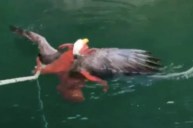A bipartisan group of senators filed a bill to create a federal ban on the commercial farming of octopus. On Thursday, Sens. Sheldon Whitehouse and Lisa Murkowski introduced the Opposing the Cultivation and Trade of Octopus Produced through Unethical Strategies Act, or the OCTOPUS Act.
In a statement, Whitehouse, a Democrat representing Rhode Island, explained that the measure "would preemptively prevent U.S. companies from participating in this brutal practice before it takes root." He added: "Octopuses are among the most intelligent creatures in the oceans. And they belong at sea, not suffering on a factory farm."
Murkowski, a Republican representing Alaska, argued that the OCTOPUS Act would not only benefit her state's marine ecosystem but also boost its economy. "As Alaska fishermen continue to navigate dire circumstances in the global market, I will continue to advocate for the most sustainable, wild-caught fisheries in the world," Murkowski said.
Citing a 2021 study on "sentience" in marine life, the lawmakers say that octopuses are capable of having feelings such as pain, pleasure, distress, and excitement. "Octopuses can learn to solve puzzles, use tools, and remember and learn from prior experiences," they said in the statement. They argue that the "humane commercial farming of octopuses is currently impossible, given their solitary nature and need for cognitive stimulation."
Dr. Jennifer Jacquet, a professor of environmental science and policy at the University of Miami, supported the argument, saying that an octopus's intelligence will likely undermine the cost and effort needed for sustainable farming. "Octopuses are carnivores and therefore commercial farming would require catching animals for their feed and be unsustainable, but they are also highly intelligent, curious, and active and will not lead good lives in factory farms," Jacquet said.
What would the OCTOPUS Act do?
According to the announcement, no octopus farms at a commercial scale exist in the U.S., so the OCTOPUS Act would prevent the market from taking off. However, an octopus farming facility has been in the works in Spain since 2021. It's expected to begin construction soon. If passed, the OCTOPUS Act would:
- Prohibit commercial octopus aquaculture operations in the country.
- Prohibit the import of commercially farmed octopus or products containing commercially farmed octopus and impose fines for violations.
- Require importers to certify that they are not importing farmed octopus.
- And, require NOAA to collect data on octopus harvest methods in trade programs under its jurisdiction.
In the announcement, lawmakers said the measure has been endorsed by 21 organizations, including animal welfare and environmental groups.




